Meet SESP’s 2022 Senior Honors Students
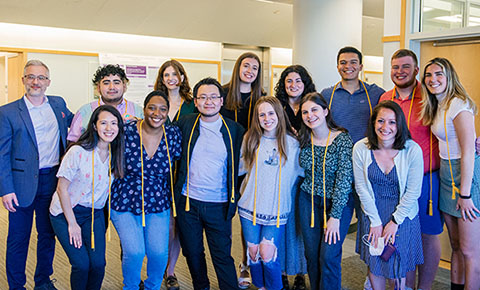 Northwestern University School of Education and Social Policy honors students were recognized for rigorous and relevant scholarship during a faculty meeting and poster presentation session.
Northwestern University School of Education and Social Policy honors students were recognized for rigorous and relevant scholarship during a faculty meeting and poster presentation session.
The 2021-22 SESP honors students include Samy Abdelsalam, Beatrice Chao, Miléna DeGuere, Hannah Klein, Lola Knight, Leah McGruder, Bobby Read, Daniel Rodriguez, Natalie Sliskovich, Emma Stein, Nina Wetoska, and Jiarui Yu.
“Their projects address incredibly timely issues, using cutting-edge methods and careful analytic approaches, to answer the important research questions,” said professor David Rapp, director of undergraduate education, who teaches the Senior Thesis Seminar. “And their answers contribute to ongoing dialogues in a variety of fields – it’s fantastic.”
Stein won third place in the Best Expo Oral Presentation category at the Undergraduate Research Awards for her project “Teaching the Apocalypse: Emotional Management in Climate Change Education.” She looked at the psychological consequences of climate change and curriculum development.
The SESP Honors Program uses a unique cohort model that provides layers of support for students. Participants meet regularly as part of Rapp’s seminar, and in addition to working with two advisers, they also connect with peers who are facing similar ups and downs.
To be eligible, students must have a 3.5 grade point average at the end of Winter Quarter during their junior year. In the spring, they can take a thesis proposal design course, Advanced Research Methods, taught by Lilah Shapiro, where they review previous studies, identify research questions, and design an independent research project tailored to their interests.
The experience inevitably leads to self-reflection; by the end of the year, they’ve learned their strengths and how to navigate obstacles. They're prepared for several possible careers after they leave Northwestern, including industry and non-profit positions, not just research in academia, Rapp said.
Other faculty and staff in the honors program included Naomi Blaushild (PhD22) who served as the teaching assistant, and Susan Olson, assistant dean for Student Affairs. For the second year in a row, Shapiro, an outstanding mentor, was an adviser or reader for five of the 12 students.
“The honors seminar is a great example of how independent research can and should be highly collaborative,” Blaushild said. “The most rewarding part was seeing students research a social policy topic that they're passionate about and successfully work through all stages of the research process.”
The senior thesis topics covered everything from the impact of COVID-19 on births in California and parenting education for high school students to social justice movements on college campuses.
Below is a full list of student projects:
Samy Abdelsalam, Learning and Organizational Change and Political Science
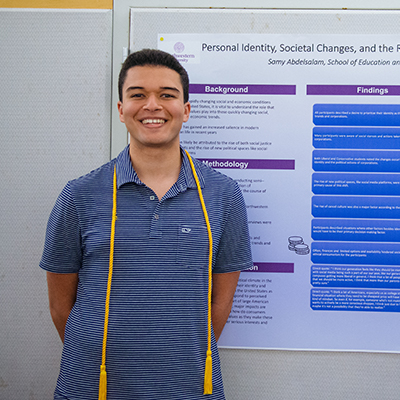 Thesis: Personal identity, societal changes, and the relationship to corporations
Thesis: Personal identity, societal changes, and the relationship to corporations
Abdelsalam interviewed current Northwestern undergraduates to explore how identity, behavior, and ideas about the corporate world intersect with modern American life. Students do care about leveraging their identity, morals, and values onto the companies where they spend their money, he says. But other factors, including financial resources, cynicism, and cancel culture, and a potential loss of interest in the cause over time can limit engagement with corporations and brands.
Advisors: Lilah Shapiro, assistant professor of instruction; and Mindy Douthit, lecturer and instructor
Beatrice Chao, Social Policy, Economics and Statistics
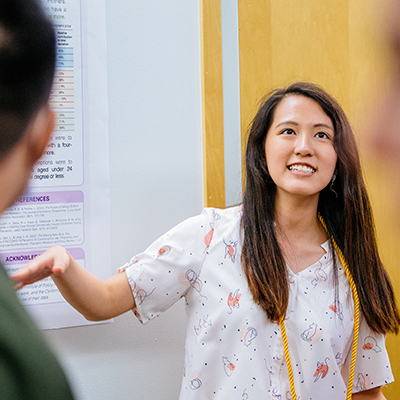 Thesis: The Impact of the COVID-19 pandemic on births in California
Thesis: The Impact of the COVID-19 pandemic on births in California
After graduation, Chao will be return to her home country of Singapore to join the public service division. For her thesis, Chao used California birth certificate data to look at how changes in births during the pandemic varied across sociodemographic groups. She showed that the pandemic interrupted a five-year period of consistently declining birth trends, with a drop in births during the first three months and a sustained increase during the next nine months. “The reduction in births was concentrated among foreign-born mothers, which I suspect are due to pandemic-related border closures rather than the effect of the pandemic on pregnancies,” she said. A change in family planning priorities may be driving an increase in births among older, higher-educated mothers. And barriers to contraception may be the force behind an increase in births to younger, lower-educated mothers.
Advisors: Hannes Schwandt, assistant professor of human development and social policy; Diane Schanzenbach, Margaret Walker Alexander Professor of Human Development and Social Policy
Miléna DeGuere, Social Policy, History
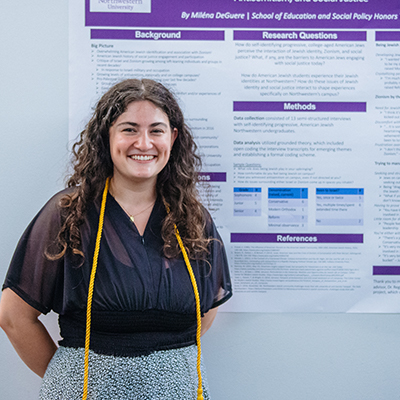 Thesis: How did we get here and where are we going? American Jewish identity in conversation with Zionism, anti Semitism, and social justice
Thesis: How did we get here and where are we going? American Jewish identity in conversation with Zionism, anti Semitism, and social justice
DeGuere will be traveling to Poland over the summer as an Auschwitz Jewish Center Fellow. She plans to pursue a master's degree in Holocaust and genocide studies after a gap year. For her senior honors thesis, she interviewed 13 progressive American Jewish undergraduate students to better understand recent periods of heightened tension on campus between supporters of Zionism/Israel and progressive left-leaning movements. Her findings suggest that progressive American Jewish students are grappling with their support for a Jewish homeland against the overwhelmingly pro-Palestine/anti-Israel sentiments among left-leaning spaces on campus. “While some American Jewish students are trying to manage the nuance of their Zionism with their disagreement towards the Israeli government’s treatment of Palestinians, they have overarching struggled to feel supported by the social justice community they’re seeking to reckon with,” she wrote.
Advisors: Lilah Shapiro, assistant professor of instruction; Regina Logan, assistant professor of instruction
Hannah Klein, Social Policy and International Studies
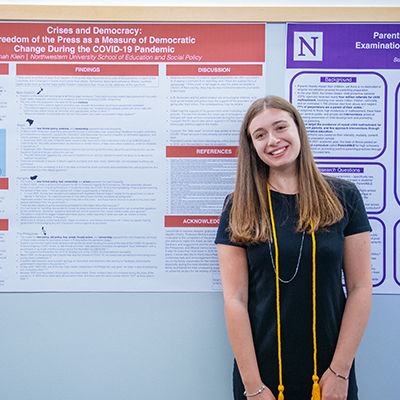 Thesis: Crises and democracy: Freedom of the press as a measure of democratic change during the COVID-19 pandemic
Thesis: Crises and democracy: Freedom of the press as a measure of democratic change during the COVID-19 pandemic
Klein, who transferred to SESP after her freshman year, is starting as a legal analyst at a law firm in Chicago. Her honors thesis explored COVID-19’s effect on democracy by measuring how the pandemic impacted freedom of the press. Using New Zealand, Brazil, Hungary, and the Philippines as case studies, she pored over newspapers, press releases, Twitter, and written policies. She found countries in the middle of the democracy scale, (Brazil and Hungary,) were far more likely to experience democratic backsliding through changes to press’s freedom than New Zealand and the Philippines. New Zealand, the most liberal democracy in her study, has checks and balances in place to protect it from major changes to its press freedom. The Philippines already had major press restrictions in place prior to the pandemic. She hopes her findings can pinpoint the countries at the greatest risk for democratic backsliding.
Advisors: Quinn Mulroy, assistant professor of human development and social policy; Haydon Cherry, assistant professor of history, Weinberg College of Arts and Sciences
Lola Knight, Social Policy
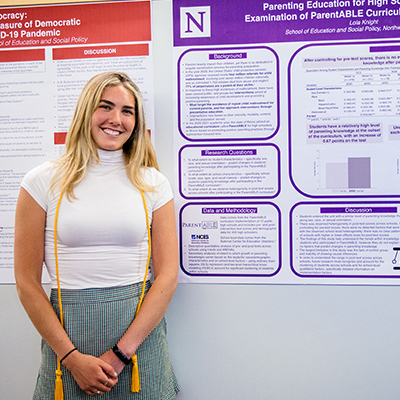 Thesis: Parenting education for high school students: An examination of the ParentABLE curriculum implementation in Illinois
Thesis: Parenting education for high school students: An examination of the ParentABLE curriculum implementation in Illinois
Knight, who will be working as a finance law development analyst at Chapman and Cutler LLP in Chicago, studied a parenting education program for high school students called ParentABLE. The curriculum used a preventative approach to positive parenting. Knight analyzed data from ten Illinois high schools but found no evidence that student- and school-level factors improve parenting knowledge. One factor could be variations in how ParentABLE was implemented. At Northwestern, Knight worked as a research assistant at Network for Nonprofit and Social Impact. She was also chief operating officer of Community Currency Corporation, a non profit start-up based out of Northwestern's startup incubator, The Garage that coordinates the collection of leftover foreign currencies from international travelers and redirects this money to fund after school programs for under-privileged youth.
Advisors: Terri Sabol, assistant professor of human development and social policy; James Spillane, Spencer T. and Ann W. Olin Professor in Learning and Organizational Change: David Figlio, Orrington Lunt Professor of Education and Social Policy
Leah McGruder, Social Policy
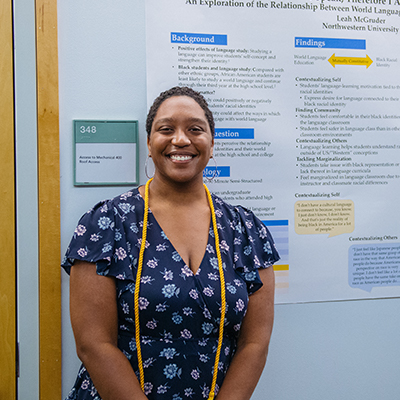 Thesis: I speak, therefore I am: An exploration of the relationship between world language study and Black student identity
Thesis: I speak, therefore I am: An exploration of the relationship between world language study and Black student identity
McGruder, who will be working as an English teaching assistant at a university in Medellin, Colombia as part of the Fulbright program, explored the relationship between studying languages and identity for Black students. Learning another language can help develop or maintain positive racial identities, but Black students are often underrepresented in these courses. At the same time, negative experiences in language courses can have the opposite effect. McGruder interviewed fourteen Black undergraduate students about their relationship with their racial identity and experiences in world language education. Her findings suggest that language curricula and instruction should be culturally responsive to Black students to support their academic and personal growth.
Advisors: Lilah Shapiro, assistant professor of instruction; Viorica Marian, Ralph and Jean Sundin Endowed Professor of Communication Sciences and Disorders, School of Communication
Robert Read II, Social Policy, Legal Studies
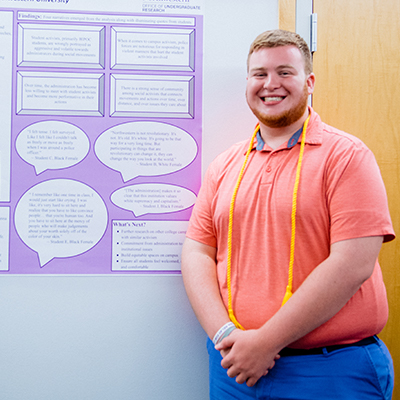 Thesis: The power of social justice movements on college campuses: An analysis of past and present movements at Northwestern University
Thesis: The power of social justice movements on college campuses: An analysis of past and present movements at Northwestern University
Read, who majored in social policy and legal studies and earned a Civic Engagement Certificate, will be attending Case Western Reserve University School of Law in the fall as a Public Interest Scholar. His research, supported by an Academic Year Undergraduate Research Grant and SESP's G. Alfred Hess Jr. Undergraduate Research Fund, looked at the power of social justice movements on college campuses, which he turned into his senior honors thesis. He found that student voices and perceptions remained relatively similar over the different movements. But the perceptions of faculty, administrators, and alumni all shifted in response to the movements on Northwestern’s campus. “The most noticeably consistent themes were students’ distrust of administration and opposition to white institutions in society while the administration’s views on student activism drastically changed over the period I studied,” he wrote. Read is president of Phi Mu Alpha Sinfonia, the world’s oldest and largest secret national fraternal society in music.
Advisors: Lilah Shapiro, assistant professor of instruction; Joanna Grisinger, associate professor of instruction, Center for Legal Studies, Paul Arntson, professor emeritus, Communication Studies
Daniel Octavio Rodriguez, Social Policy and Legal Studies
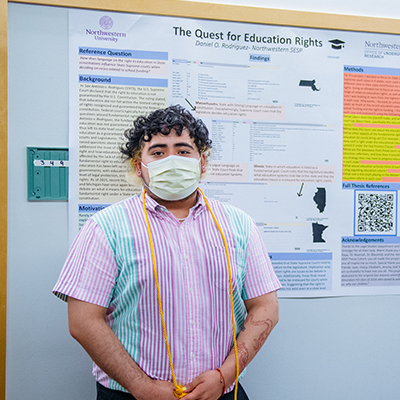 Thesis: The quest for education rights: An in-depth analysis into US states and their view on education rights
Thesis: The quest for education rights: An in-depth analysis into US states and their view on education rights
Rodriguez examined how courts use language about the right to education in their state constitutions when deciding on cases related to school funding. He argues that state supreme courts place much of the burden of education rights on the legislature (Illinois, Massachusetts, Michigan, and Minnesota) even when the state constitution declares education a duty of the legislature. His thesis also showed how supreme courts across four different states view the role of courts and litigation in the context of school funding. Rodriguez is taking a gap year before starting law school; he plans to work in higher education marketing and outreach.
Advisors: Joanna Grissenger, associate professor of instruction, Center for Legal Studies; David Rapp, professor of psychology and learning sciences
Natalie Sliskovich, Human development and Psychological Services and Music
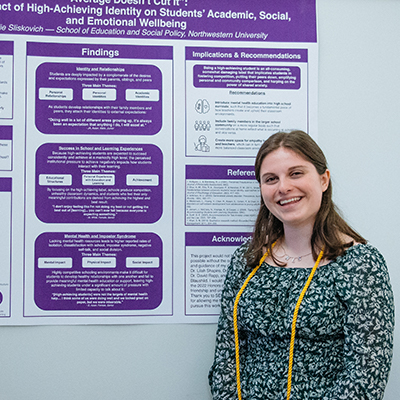 Thesis: “Average doesn’t cut it : The impact of high-achieving identity on students’ academic, social, and emotional well-being.
Thesis: “Average doesn’t cut it : The impact of high-achieving identity on students’ academic, social, and emotional well-being.
Sliskovich will begin a master’s in education at the University of Pennsylvania in the Graduate School of Education, where she will continue to study human development. For her thesis, she interviewed ten Northwestern undergrads to explore how the label “high achiever” and pressure to do well can affect the social, emotional, and academic wellbeing students. She found that high-pressure academic environments encourage greater levels of academic anxiety, social anxiety, and competition, decreased overall satisfaction with school, longevity of social relationships, and student self-concept as it relates to intelligence and overall success. She hopes her work can increase awareness of student wellbeing on high school and college campuses among faculty, peers, and family members and encourage greater access to mental health resources and programming for students before college.
Advisors: Lilah Shapiro, assistant professor of instruction; Timothy Dohrer, assistant professor of education
Emma Stein, Social Policy
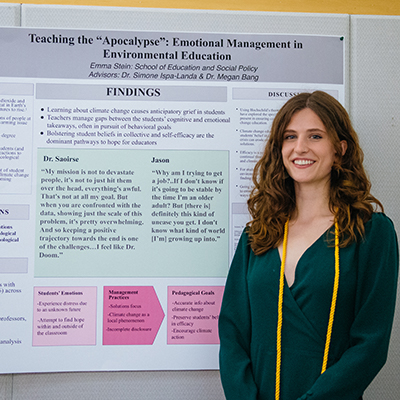 Thesis: Teaching the “apocalypse”: Emotional management in climate change education
Thesis: Teaching the “apocalypse”: Emotional management in climate change education
Stein looked at the psychological consequences of climate change and whether educators are incorporating these ideas into their teaching. Drawing on interviews with professors and students in the environmental policy, science, and engineering departments and classroom observations of environmental courses at Northwestern, she examined how educators manage students' emotions within the context of climate change and ecological disaster and how students process and the psychological demands of climate change education. Her findings suggest that instructors “use different strategies to evoke feelings of hope and self-efficacy to comply with the feeling rules of their teaching practice while maintaining their cognitive goals of teaching.”
Advisors: Simone Ispa-Landa, associate professor of human development and social policy; Megan Bang, professor of learning sciences
Nina Wetoska, Learning and Organizational Change, Spanish
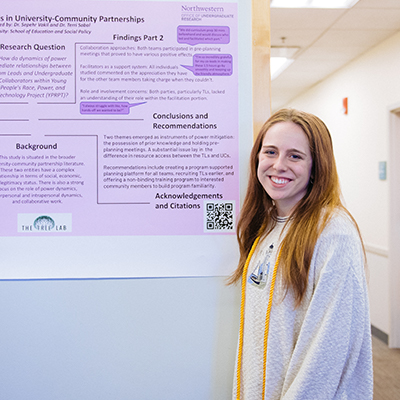 Thesis: The effects of power dynamics in university-community partnerships
Thesis: The effects of power dynamics in university-community partnerships
Wetoska studied the power dynamics between undergraduate students and adult community members within the realm of university-community partnerships. Her project focused on an out-of-school learning initiative, which brought the university together with several community organizations. With shared goals defined before the project began, these partnerships tried to provide the best possible instruction, support, and working environment for the participants and address potential power imbalance. “Partnerships like these come from networking efforts on the part of the university,” she wrote. “The university connects and engages with leaders and representatives who are connected to local organizations to initiate a relationship and support the co-construction of knowledge."
Advisors: Sepehr Vakil, assistant professor of learning sciences; Terri Sabol, assistant professor of human development and social policy
Jiarui Yu, Learning and Organizational Change, Piano, Philosophy
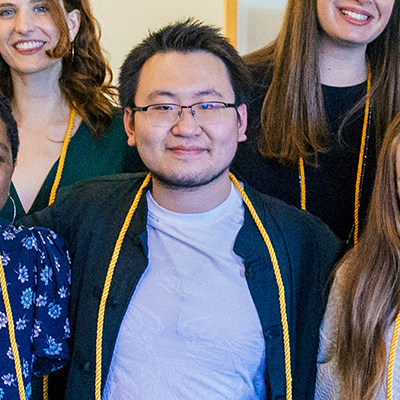 Thesis: Impact of benefit-framed messages on public attitudes towards prison education
Thesis: Impact of benefit-framed messages on public attitudes towards prison education
Yu recruited 240 online participants to examine what type of messaging can attract public support for US. prison education programs. He found that short term exposure to three benefit-oriented messages didn’t have much of an effect and that most participants were already aware of the benefits of prison education prior to being exposed to the messages. The two most commonly cited reasons for support were education being a fundamental right for all and its effectiveness at reducing recidivism. The limitation of short-term exposure is relevant, he said, when considering how prison reformist organizations reach out to their targeted audiences through email, websites, or flyers. “Future studies might benefit from manipulating factors such as exposure time, delivery method, crime type, and sentence length.”
Advisors: Jolie Matthews, assistant professor of learning sciences; Megan Huyska, assistant professor of philosophy